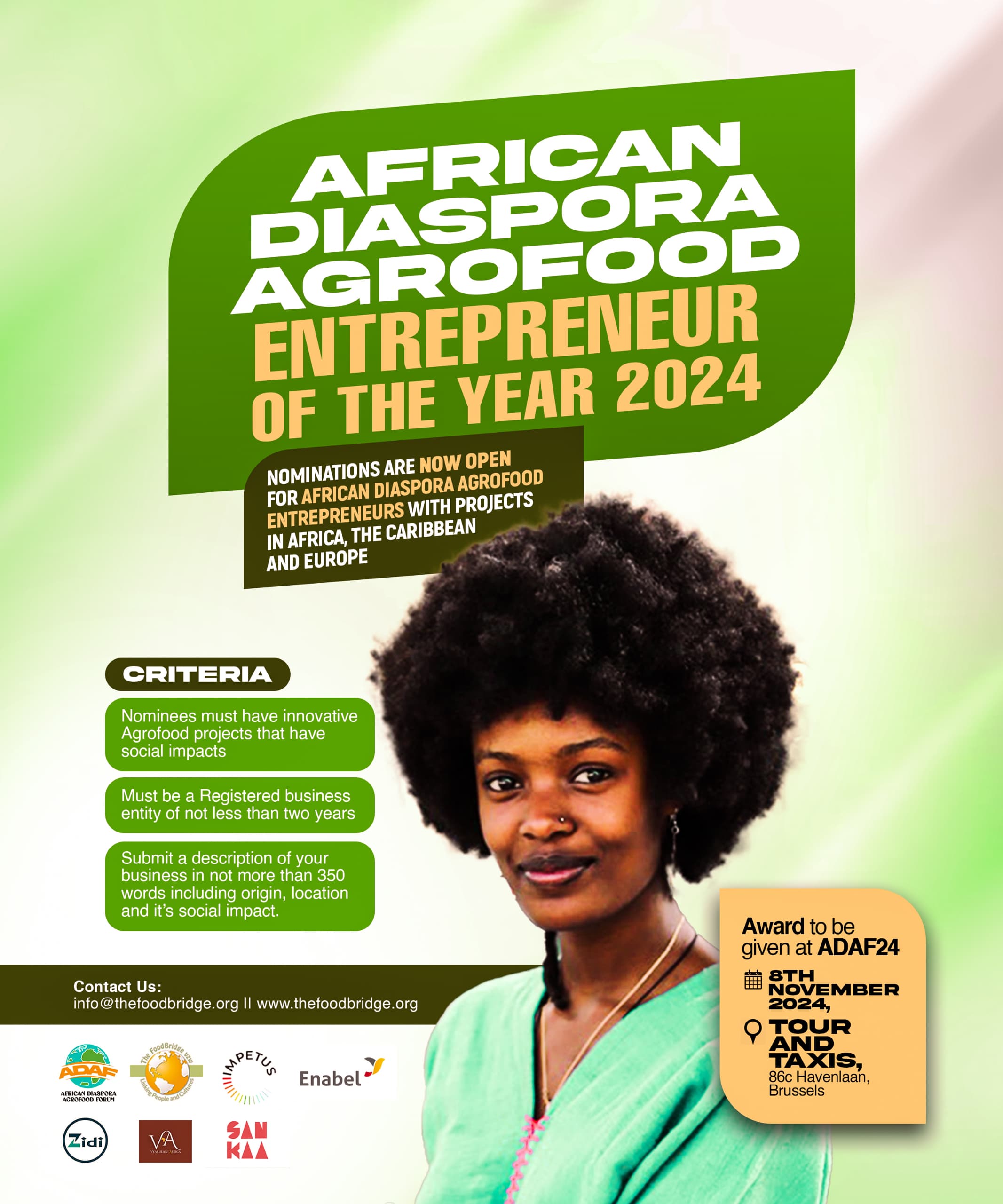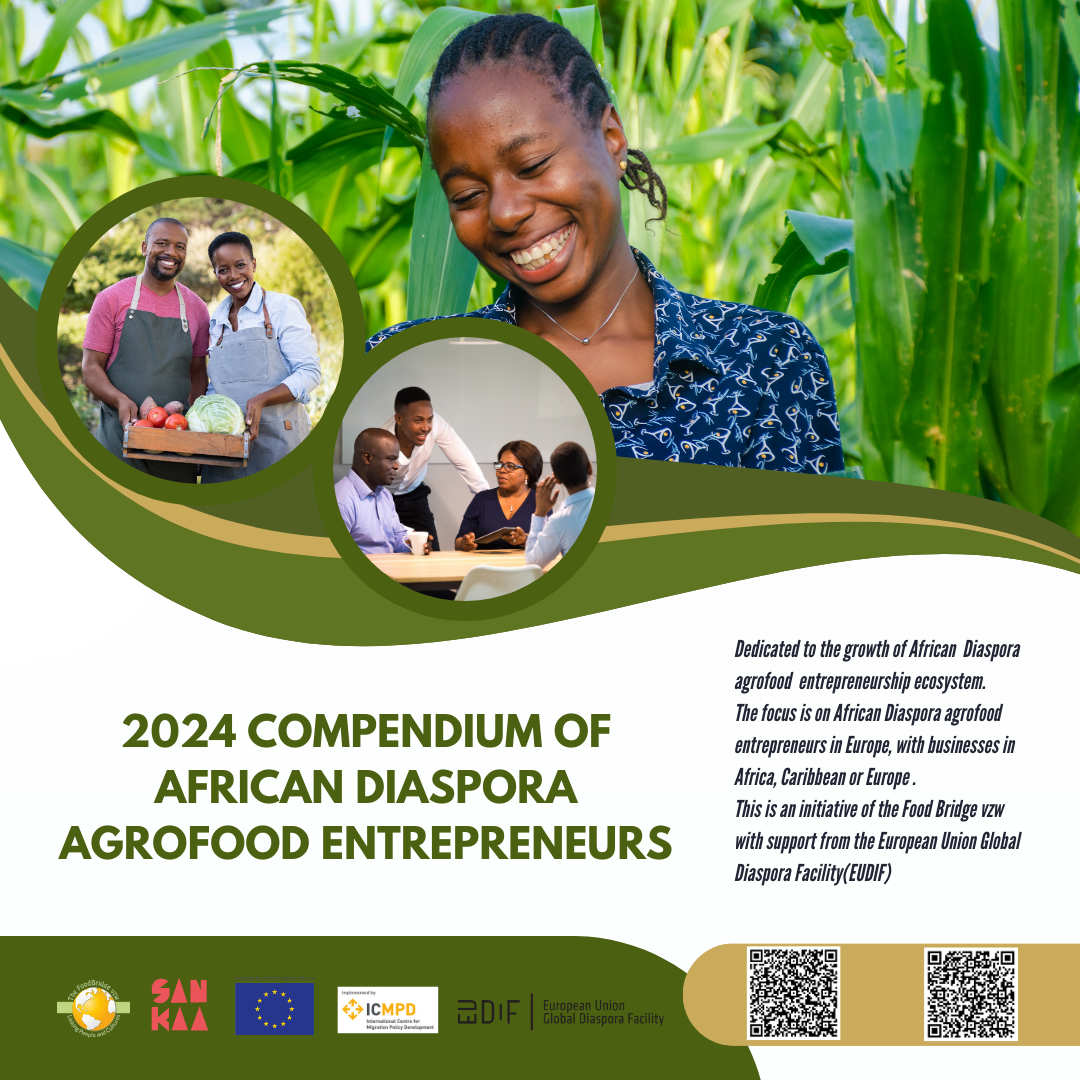8 - 10 November 2024. African Diaspora Agrofood Forum (ADAF 2024)The African Diaspora Agrofood Forum, offered a platform for African diaspora agrofood entrepreneurs, stakeholders and interested members of the public to convene, exchange ideas, explore opportunities for growth in the agrofood sector and experience African food innovations.
It is an annual event organised by the FoodBridge. The FoodBridge, a non-profit organization based in Belgium, manages several projects aimed at promoting food culture, heritage, and community support.
The FoodBridge was selected by the Global Forum for Agricultural Research (GFAiR) among the 21 applications of Expressions of Interest on Forgotten Foods.
- The purpose of this request for Expressions of Interest was to identify organizations interested in participating in a Collective Action (CA) dedicated to reviving forgotten foods, with a particular focus on their inherent nutritional value and resilience to climate change.
- Through this initiative, the aim is to empower small scale producers as key actors in the pro-poor transformation of agri-food research and innovation systems.
- The CA will actionable strategies designed to empower farmers to demonstrate the vast potential of their crops, advocate for their challenges and needs, and overhaul research and innovation systems in favour of forgotten foods and of farmers’ traditional knowledge and governance structures.
Key highlights of the event included:
- Expert Panels and Keynote Speeches: leading experts and thought leaders on current trends, challenges, and opportunities within the African agrofood sector.
- Workshops and Training Sessions: interactive workshops designed to enhance skills and knowledge in various aspects of agrofood production, marketing, and consumption.
- Networking Opportunities: Connecting with peers, professionals, investors, and policymakers to build strategic partnerships and collaborations.
- Exhibition: 2 days exhibition fair to taste innovative agrofood products
- Presentation of the African Diaspora agrofood entrepreneur of the year award and the annual compendium of African diaspora agrofood entrepreneurs
Policy Dialogue Panel: Facilitating Innovative Agrofood Entrepreneurship; African Diasporas and the 2030 Agenda
This panel discussed the role of the African Diaspora in driving innovative agrofood entrepreneurshipthat aligns with the UN’s 2030 Agenda for Sustainable Development.
The panel was moderated by GFAiR.
2024 African Diaspora Agrofood Entrepreneur of the year
Entrepreneurship is deeply intertwined with the migration stories of African diasporas, particularly in the agrofood sector. Over the years, many in the diaspora have harnessed their resources to launch agrofood projects, which often go unrecognized in mainstream development narratives and data. To spotlight these efforts, the African Diaspora Agrofood Entrepreneur of the Year award was conceived, honoring those making significant impacts in the sector.
In her acceptance speech, Kanté shared that the name of her tea brand honors her heritage (her family originates from Guinee Conakry) and Africa’s rich resources, which she aims to share with tea lovers and connoisseurs worldwide. Kanthé’s offerings include 100% African teas, infusions, and honeys sourced from premium plantations in Malawi, Mali, Rwanda, Guinea, South Africa, and Togo.Resource: 2024 Compendium of African Diaspora Agrofood Forum
This publication aims to support and promote the growth of the African Diaspora agrofood entrepreneurship ecosystem. The 2024 African Diaspora Agrofood Entrepreneurs Compendium is produced by The Food Bridge vzw in collaboration with the European Union Global Diaspora Facility (EUDiF). This collaboration is motivated by a mutual desire to facilitate and support the African Diaspora entrepreneurial ecosystem in Europe. The Food Bridge vzw is a Belgian non-profit organisation with different agrofood and diaspora engagement projects in Belgium, Nigeria and Ghana.
Policy makers, experts and entrepreneurs discussed how to create policies that foster growth,
sustainability and opportunity in agrofood sectors across Africa and its diaspora.
sustainability and opportunity in agrofood sectors across Africa and its diaspora.
- Mr. Jeremy Knops, general delegate COLEAD
- Ms. Bijou Tshiunza, founder MICRODEV
- Mr. Rashad Al-Khafaji, Director FAO Laison office to the EU & Belgium
- Mr. Marie d'Huart, CEO Virunga Origins
2024 African Diaspora Agrofood Entrepreneur of the year
Entrepreneurship is deeply intertwined with the migration stories of African diasporas, particularly in the agrofood sector. Over the years, many in the diaspora have harnessed their resources to launch agrofood projects, which often go unrecognized in mainstream development narratives and data. To spotlight these efforts, the African Diaspora Agrofood Entrepreneur of the Year award was conceived, honoring those making significant impacts in the sector.- In 2022, this prestigious award, organized by The Food Bridge, was presented to Mr. Cyril Sanjoh, a Cameroonian entrepreneur revolutionizing the international agrifood landscape. His company, Sansusa, registered as a Common Initiative Group (CIG) in 2014, is committed to sustainable farming practices, producing a diverse range of crops and livestock.
- In 2023, Mr. Alpha Diallo, founder of Africapaid, received the award for his innovative work at WELLI Farm in Senegal. His farm addresses food security challenges by focusing on fruit, vegetable, and dairy production while supporting the local community. Diallo’s approach is especially notable for his collaboration with local women, who collect farm produce on credit
and sell it at markets, keeping 100% of the profits. - In 2024 Ms Maimouna Kanté, founder of Maison Kanthé France, has been named the Food Bridge's 2024 African Diaspora Agrofood Entrepreneur of the Year. This award, presented at the African Diaspora Agrofood Forum and sponsored by Entrepreneurs for Entrepreneurs Belgium, celebrates African diaspora agrofood entrepreneurs who make significant community impacts and show strong potential for growth.
In her acceptance speech, Kanté shared that the name of her tea brand honors her heritage (her family originates from Guinee Conakry) and Africa’s rich resources, which she aims to share with tea lovers and connoisseurs worldwide. Kanthé’s offerings include 100% African teas, infusions, and honeys sourced from premium plantations in Malawi, Mali, Rwanda, Guinea, South Africa, and Togo.
Resource: 2024 Compendium of African Diaspora Agrofood Forum
This publication aims to support and promote the growth of the African Diaspora agrofood entrepreneurship ecosystem. The 2024 African Diaspora Agrofood Entrepreneurs Compendium is produced by The Food Bridge vzw in collaboration with the European Union Global Diaspora Facility (EUDiF). This collaboration is motivated by a mutual desire to facilitate and support the African Diaspora entrepreneurial ecosystem in Europe. The Food Bridge vzw is a Belgian non-profit organisation with different agrofood and diaspora engagement projects in Belgium, Nigeria and Ghana. EUDiF is a project funded by the European Union and implemented by the International Centre for Migration Policy Development. It strives to maximize the potential of diaspora engagement for development by generating knowledge, facilitating dialogue and providing capacity development support to diaspora organizations and partner countries.
It is featuring African diaspora agrofood entrepreneurs based in Europe, who operate businesses in Africa, the Caribbean, or Europe. Selected entrepreneurs will be highlighted in this year's edition.
Conclusion and recommendations
Women entrepreneurs engaged in food processing in Africa, in particular the African Diaspora, have unique opportunities to improve nutrition by leveraging their positions to create healthier, locally sourced, and culturally relevant food products. For example, women-led businesses can focus on processing traditional, nutrient-dense foods that are often overlooked by large-scale industrial producers, such as indigenous grains, legumes, and vegetables. These women entrepreneurs can innovate by fortifying common foods with micronutrients like iron, vitamins, and minerals to address local nutritional deficiencies, such as anemia or vitamin A deficiency.
Additionally, they can promote healthier alternatives to processed snacks by creating low-sugar, high-fiber, and nutrient-rich products that cater to local tastes. By using local ingredients, women entrepreneurs can also support regional agriculture, boosting food security and encouraging sustainable farming practices. Furthermore, women-run food enterprises can serve as platforms for education, teaching communities about the benefits of nutritious eating and helping to shift consumer behavior towards healthier, more balanced diets. These efforts not only improve the nutrition of local populations but also empower women entrepreneurs to play a central role in shaping the health and economic landscape of their communities.
Highlights - See blogposts:
- Spotlight on GAMAAL: a dynamic homecooked food app dedicated to connecting cultures through the universal language of food https://gamaal.co.uk/
- Spotlight on Virunga origins: Virunga Origins is a social enterprise located in the Democratic Republic of Congo. Its mission is to produce delicious, superior quality goods and create lasting societal change through sustainable agriculture, working practices, training, and employment opportunities.
- Spotlight on Glim Africa: Founded in 2020 in France and 2021 in Cameroon, Glim Africa was created to provide local alternatives to the massive imports of wheat and rice in Cameroon and across Africa. Glim Africa focused on promoting local agriculture by developing products from indigenous crops such as cowpea (niébé), recognized by WWF as one of the 50 foods of the future.
- Spotlight on Hordesia: HORDESIA’s catering service, Sekayi, offers a variety of unique products that bring the flavors of the DRC to Belgium. Their main offerings include Sauce Mbika (pumpkin seed sauce), Mbika and vegetable patties, red currant coulis, and baobab powder.
- Spotlight on Vyakulani Africa Project: Vyakulani Africa Project (June 2024 – January 2025) The aim of the project is to document African diaspora foodways in Belgium.
Related:
EUDiF is pleased to invite diaspora organisations, from countries listed in the Neighbourhood, Development and International Cooperation Instrument (NDICI) regulation regulation and registered in an EU member state, Switzerland or Norway, to submit a proposal for small-scale projects amounting from 25,000 to 60,000 EUR. D4D Grants aim to promote sustainable development by supporting diaspora-led initiatives in the country of origin in the areas of climate, economy, education and health. Full details on the call are available in the Guidelines for applications. |
Key dates:
|











No comments:
Post a Comment